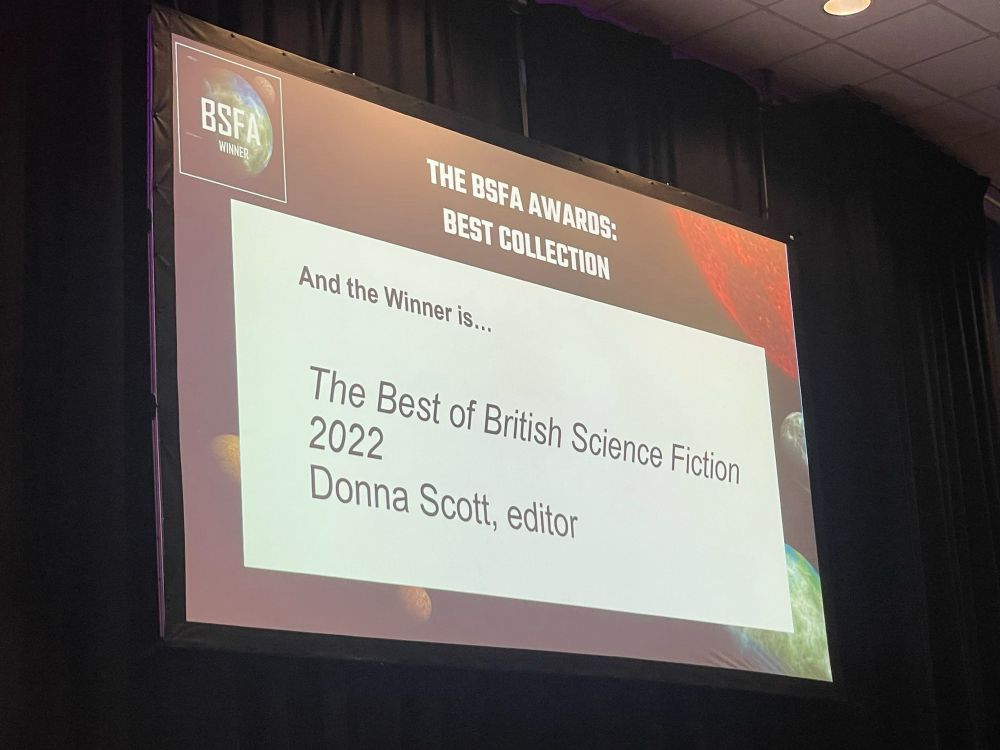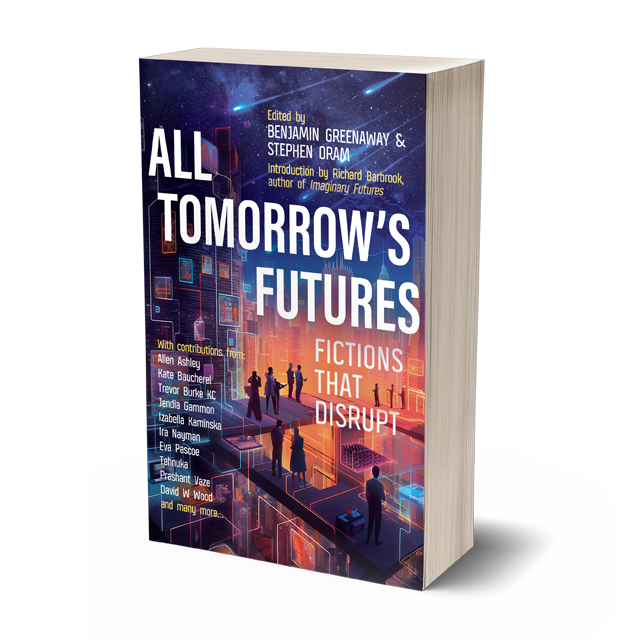
Here you will find my publishing announcements, news of promotions and publicity events, a regularly updated bibliography, also updates about my current writing projects. If you enjoy visiting this site please come back soon.
Recent Changes to Website
- News item below and update to Published Fiction (12 April 2024)
- News items below and updates to Published Fiction (10 April 2024)
- News item below and updates to Published Fiction, Recognition, and Projects & Positioning pages (3 April 2024)
Latest News
Star disappears in a flash
12 April 2024
(My run of acceptances continues…)
I’m delighted to announce that Jason Brick‘s Flash In A Flash Patreon will be reprinting my flash SF story Starless on 25 April.
Growth through travel
10 April 2024
I am delighted to announce that Trevor Denyer has accepted my science fantasy short story Growing Up for publication in either issue 1 or 2 of his new magazine, Roads Less Travelled.
This will be my 57th published short story.
Halcyon days
10 April 2024
I am delighted to announce that the editor of Ef-Zin, a Greek SF fanzine, has accepted On This Day for translation and reprinting in their next issue. It will be the second translation for this story, which was originally published in Nature Futures, and my twelfth foreign language in all.
It was the best of levitations
3 April 2024
I had a wonderful time at the BSFA Eastercon (Levitation 2024) from 29 to 31 March. This was an exceptionally well run and enjoyable convention, with the Telford International Centre providing an ideal venue. Highlights included being on the Doctor Who and the Industrial Revolution panel, which was great fun, also the launch and associated learning-themed panel for Cybersalon’s All Tomorrow’s Futures: Fictions That Disrupt anthology, which was doing good business in the dealer’s room. Best of all though was witnessing editor Donna Scott collect the BSFA Award for Best Collection for Best of British Science Fiction 2022. Donna richly deserves this accolade, having performed sterling work editing the series for Newcon Press since its inception in 2016. Hearing her read out the names of her “2022” authors during her acceptance speech was, I have to say, a genuine thrill. I never thought I’d hear my name mentioned in an awards ceremony! The glory is, of course, Donna’s!

Selling tomorrow’s futures
14 March 2024
I’m delighted to announce that the new Cybersalon anthology, All Tomorrow’s Futures: Fictions That Disrupt, which contains my new SF story Elephant Talk, is now available to pre-order from Amazon. As well as hardback and paperback editions, there is a Kindle edition that currently costs only £0.99/$0.99, which represents amazing value for a 350-page book crammed with excellent fiction and insights from subject matter experts. The Kindle edition’s price will rise soon, so please pre-order it now!
If you purchase the book, the publisher, editors, and authors would be delighted if, after you’ve read it, you could leave a short review on Amazon. The more reviews it receives, the more copies it will sell.
Launching levitating panels
12 March 2024
(List updated on 15 March.)
I’ll be attending the BSFA Eastercon (Levitation 2024) from 29 to 31 March. My provisional schedule is as follows:
Fri 29 March (17:30-18:30): NewCon Press Launch Party (invited attendee)
Sat 30 March (16:00-17:00): Doctor Who and the Industrial Revolution (panel member)
Sat 30 March (17:30-18:30): Futures That Disrupt anthology launch (Cybersalon guest)
Sun 31 March (16:00-17:00): Machines Learn; Humans Thrive (panel member)
At this stage, I wouldn’t rule out additional panels or changes to the above timings. I will update this post as necessary.
Just to make things more “interesting”, in the UK the clocks will go forward one hour on Sun 31 March at 01:00.
Please send me a message if you would like to meet up at the convention.
It was the best of award shortlists
1 March 2024
As regular visitors to this website will know, I was absolutely delighted to have a story included in the Best of British Science Fiction 2022 anthology from Newcon Press. Now, I am just as delighted to announce that this book has been shortlisted for the BSFA Award in the Best Collection category. What a coup for editor Donna Scott in particular, but also for publisher and cover designer Ian Whates, and every writer who had their work reprinted in this book.
A mind-boggling number of my writer friends have their work included on this year’s BSFA Award shortlists, in various categories. Congratulations to them all! But a special shout-out goes to my dear friend and fellow OSB writers’ group member, Jaine Fenn, whose short story collection Strange Attractors (also from Newcon Press) is deservedly shortlisted in the … Best Collection category. (Okay, I’ll admit my loyalties are now somewhat torn…)
Good luck to everyone who has work on the shortlists!
Don’t let the dust settle!
27 February 2024
I’m delighted to announce that my flash-length SF/horror story ‘Dust Bunnies’ will be reprinted in Stupefying Stories: Showcase.
‘Dust Bunnies’ originally appeared in Shoreline of Infinity #34.
Did you know?
63% of my published stories have been reprinted or are scheduled for reprinting.
Why settle for just one future?
19 February 2024
I’m delighted to announce that my SF story ‘Elephant Talk’ is included in this amazing new anthology from Cybersalon Press, which will be launched this Easter during the Levitation 2024 convention at Telford, UK. For more news, please sign up to Cybersalon’s free newsletter at their website.
“What a wonderful and inspiring alternative to the so-called ‘world-building’ of today’s science fiction industry. Here are some real lessons on how to speculate in ways that may actually open new potentials for human flourishing.” Douglas Rushkoff.

Glass refilled with stars
13 January 2024
I’m delighted to announce that my SF story ‘Star in a Glass’ has been reprinted in Internova Issue 5.
This one has been a long time coming. It’s one of my favourite stories, so I’m happy to see it reprinted at last. It was originally published in the Music For Another World anthology (2010). Subsequently, it was accepted for reprinting in Internova in 2013. But then the site went on an extended hiatus, re-appearing only recently. We got there in the end!
Left behind in France
4 January 2024
I’m delighted to announce that French magazine Galaxies Science-Fiction has accepted my short story Those We Leave Behind for translation and reprinting. This will be the first time that one of my stories has been translated into French, and my eleventh foreign language in all.
Those We Leave Behind was originally published in Sci Phi Journal (2022).
Why settle for just one future?
19 February 2024
I’m delighted to announce that my SF story ‘Elephant Talk’ is included in this amazing new anthology from Cybersalon Press, which will be launched this Easter during the Levitation 2024 convention at Telford, UK. For more news, please sign up to Cybersalon’s free newsletter at their website.
“What a wonderful and inspiring alternative to the so-called ‘world-building’ of today’s science fiction industry. Here are some real lessons on how to speculate in ways that may actually open new potentials for human flourishing.” Douglas Rushkoff.

Glass refilled with stars
13 January 2024
I’m delighted to announce that my SF story ‘Star in a Glass’ has been reprinted in Internova Issue 5.
This one has been a long time coming. It’s one of my favourite stories, so I’m happy to see it reprinted at last. It was originally published in the Music For Another World anthology (2010). Subsequently, it was accepted for reprinting in Internova in 2013. But then the site went on an extended hiatus, re-appearing only recently. We got there in the end!
Left behind in France
4 January 2024
I’m delighted to announce that French magazine Galaxies Science-Fiction has accepted my short story Those We Leave Behind for translation and reprinting. This will be the first time that one of my stories has been translated into French, and my eleventh foreign language in all.
Those We Leave Behind was originally published in Sci Phi Journal (2022).
Proudly powered by WordPress
